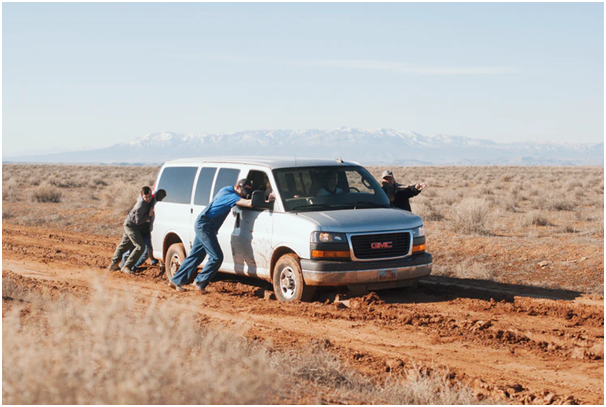Have you ever lain on your bed the night before a road trip and anxiously wondered what you would do if your car broke down on the way? The first step is to steer your vehicle steadily towards the side of the road and switch on your hazard lights.
Just about everybody has had a car scare on a long drive. Save this article for a rainy day, so you know what to do if your car breaks down on a road trip.
Things To Consider During The Trip
If you find yourself in an unknown area, make a note of your location and contact the emergency services. Stay calm and make sure you’ve steered yourself onto the side of the road so that you’re not blocking oncoming traffic.
- If You See An Engine Oil Warning Sign
If you’re on the road and happen to see your engine oil light suddenly flash, try not to panic. It is easier said than done but try to remain steady as you slowly steer your car onto the side of the road.
Your first task is to see if there are any auto repair shops nearby. They can help you diagnose how serious the problem is and if you require a mechanic immediately.
If there seems to be no help nearby, call a tow truck.
Under no circumstances should you ignore the warning light or even delay addressing it for a few hours. This can do some serious, potentially irreversible, damage to your car.
- Call Roadside Assistance
Once you’ve parked your car in a safe location, call roadside assistance to tow your car. Call someone to pick you up. Do not leave your vehicle alone while you wait for help. Make sure your hazard lights are on so that roadside assistance can find you easily.
If you don’t have towing services included in your insurance or aren’t an AAA (American Automobile Association) member, you’ll have to contact a local towing company for hire. Make sure you get a quote–- these services can be expensive.
- Get A Good Mechanic
Hopefully, you’re stuck in an area not too far from a city so you have a selection of mechanics. Make sure you read reviews of the mechanics you choose to repair your car: a second-rate mechanic will not only make you anxious, but you might also sustain some serious damage to the components.
However, if you’re stuck near a small town that rarely has more than one auto mechanic, you’ll have no option but to consult with them. You might not be satisfied with the service you receive there. In such a case, it’s best to get it repaired enough to drive you back home where you can get it checked out by a trusted mechanic.
- Rent A Car And Go On With Your Trip
If your car needs a few days or weeks to be fully functional and safe to drive, decide if you are going to wait till it’s fixed or not. You can opt to use a rental car for the rest of your trip.
- Look For Hotels Around The Area
If you decide to stay while your car is under repair, search for nearby hotels to stay and get comfortable.
If you have a warranty, you’ll probably be fully reimbursed for the repair expenses as well as your stay.
Things To Consider Before You Depart
Before you get on the road, run a couple of checks on your car to make sure it’s ready for the journey. Long trips are very stressful on various components. It’s a good idea to replace a few parts like the starter motor because it might wear and tear somewhat. Looking for specialized companies like Sunway classic auto parts to purchase some parts would be safer.
- Check Your Fluids and Lights
Long drives can quickly diminish the levels of various fluids in your car. Brake fluid, coolant, power steering fluid, transmission fluid, and engine oil levels should be your top concerns.
Make sure your taillights, headlights, and hazard lights are fully functional. They cannot fail on the freeways!
Any external accessories like neon lights should always be purchased and fixed from reputable sources.
- Tire Pressure
Your tire pressure should match your manufacturer’s recommendation. While higher pressure is safe for stop-and-go city driving, sticking to the recommended PSI (Pounds per Square Inch) is better because of the higher, sustained speeds you’ll employ.
- Pack An Emergency Kit
Your emergency can come in handy when you’re awaiting help on the roadside. Ensure that your emergency kit contains jumper cables, a first-aid kit, blankets, a few bills, and an extra charger. Pick up a spare tire if your car doesn’t come equipped with one.
- Test Drive
Listening to your car is the best way to prevent breakdowns and prolong its life. A faulty starter motor or battery makes a ticking noise; a broken axle clicks loudly; a bad wheel bearing will squeal and growl.
- Do Not Skimp On Auto Maintenance
The best way to prevent breakdowns is regular maintenance–- not only does this preserve the resale value of your car, but it also makes sure you don’t spend big money replacing often expensive parts.
Conclusion
Car repairs can very well break your bank. Do not overlook regular auto services; it can mean the difference between a car that lasts 5 years and one that lasts 15 years.
Engine component replacement can cost up to $10,000, which is money most Americans can’t afford in a single stroke.
Eventually, with wear and tear, something is going to break down and require replacement. Your service provider can warn you of upcoming expenses.

